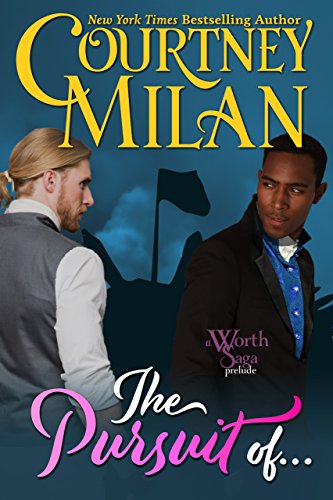“He gritted his teeth and tried to smash the other man’s head.
The other man ducked out of the way. “Nice weather for a siege, isn’t it?”
John, a black American soldier, is busy just trying to survive the Battle of Yorktown, so when he happens upon a British officer skulking in the woods, his first thought is to kill him. Luckily, he decides to spare his life, with the other man promising to search him out after the war in return for his mercy. John, used to the non-promises of rich white men, thinks nothing of it, and so is surprised when the man actually shows up in the Revolutionary soldier’s camp days after the surrender. He has no time for a probably insane British officer, considering he’s worried by the lack of correspondence from his sister. So when he flippantly suggests Henry can help him by accompanying him on his trek from Virginia back to his family in Rhode Island, expecting to be brushed off, he’s alarmed when he accepts.
“I am a cheesemonger,” Henry said. It was a complete lie, but the story almost didn’t matter. “Cheese is my livelihood. I am here for the purpose of purveying cheese.”
The men exchanged confused glances and Henry made a mental note: Next time, less emphasis on cheese.
Henry is… well, Henry is, in his words, is odd, even for an obviously well-off British officer. In John’s words, he’s “something of a puppy—earnest, exuberant, and utterly devoid of house-training.” Over the course of their road trip back to John’s family, they slowly begin to become friends, and then more. I would not have thought that you could write a character as sympathetic as a black ex-slave Revolutionary soldier, but Henry nearly meets that. I won’t spoil why that is, just reiterate that Ms. Milan knows how to bring all the feels to the party.
“An ideal set in motion is a dangerous thing. You can’t control who believes it, or whether they take it to heart. ‘All men are created equal.’ Think of the power of that phrase.”
It’s refreshing for a m/m romance as there’s no angst over their orientations – they’ve both long ago accepted that they’re gay and also both quickly realize the other is as well. There’s a lot of good dialogue around allyship, as well, around the thorny bits of performative allyship, selfish allyship versus actually being an ally. In the midst of a delightful slow-burn, well-characterized, utterly hilarious romance, we’ve got the best explanation and demonstration of what allyship should look like. And this, probably, is why I keep coming back to Ms. Milan’s work, because I can count on finishing one of her stories with a whole lot of happy feels, some teary angst, and also a moral about how everyone has some inherent worth.
In summary, if you’re looking for a hilarious historical with all the feels, read this, or any other of Ms. Milan’s work.
